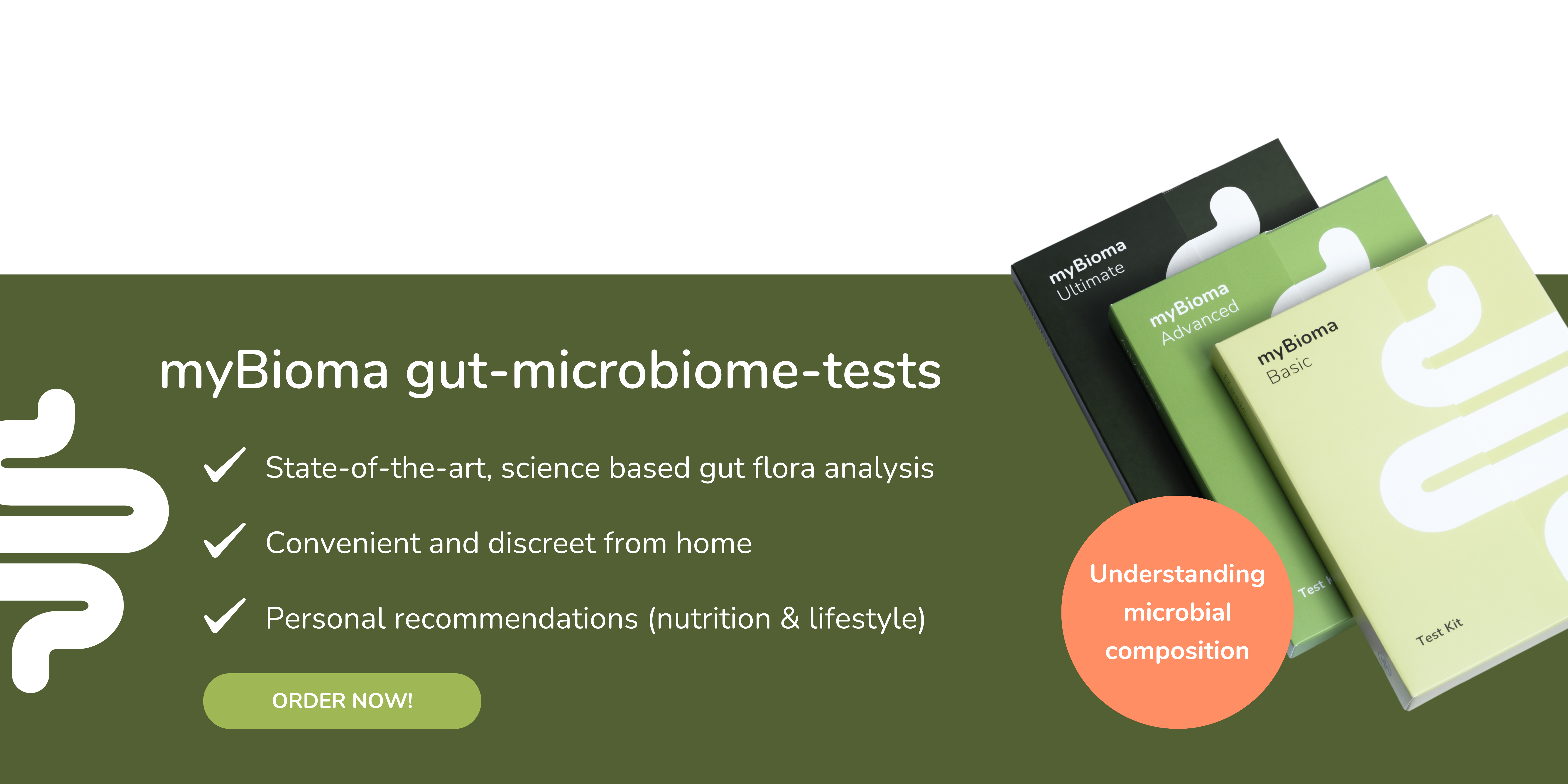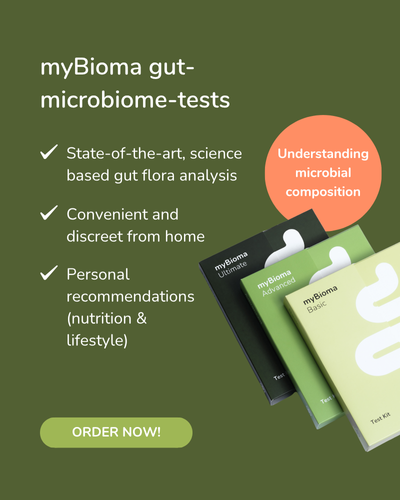Table of contents
- How the body normally regulates blood sugar
- When blood sugar regulation is disturbed
- How the microbiome can influence blood sugar
- Pre- and probiotics for blood sugar regulation: potential with limitations
- Support your gut microbiome & keep blood sugar steady – here’s how to do it in everyday life.
- Myths and facts about blood sugar regulation
- Conclusion: the gut as the key to glucose control
Until a few years ago, the gut was primarily known for its role in digestion. Today, we know that the gut is far more than just a "food processing organ." It is home to trillions of microorganisms – our gut microbiome. This finely tuned ecosystem of bacteria, viruses, fungi, and archaea influences far-reaching processes in our body – from the immune system to the regulation of blood sugar levels.
Given the global increase in type 2 diabetes (T2DM), one aspect is increasingly becoming the focus of research: the question of how the microbiome controls our metabolic health – and whether we can influence it in a targeted manner.
How the body normally regulates blood sugar
Carbohydrates are the body’s most important source of energy and have a direct impact on blood sugar levels. They are mainly found in foods such as bread, rice, pasta, potatoes, legumes, fruit, but also in sweets and sugary drinks. After consumption, they are broken down into their sugar components – primarily glucose – in the digestive tract and absorbed into the bloodstream via the small intestine. This causes blood sugar levels to rise. The pancreas responds by releasing insulin – a hormone that helps transport the sugar into the body’s cells, especially in the muscles and liver. There, the glucose is either used directly for energy or stored as glycogen (the storage form of glucose). As a result, blood sugar levels drop back to normal. This finely tuned process occurs several times a day in healthy people – usually without us noticing (1).
In addition to carbohydrates, proteins can also slightly raise blood sugar—especially in a low-carbohydrate diet. Fats, on the other hand, don't directly affect blood sugar, but they can slow gastric emptying and thus delay or mitigate the rise in blood sugar.

Schematic representation: This is how blood sugar regulation works in a healthy body.
Different foods cause blood sugar to rise to very different degrees. This depends, among other things, on:
- The glycemic index (GI) – a measure of how quickly a food causes blood sugar to rise. Foods with a high GI cause blood sugar to rise more quickly than foods with a low GI.
- The fibre content – fibre slows down glucose absorption.
- The degree of processing – highly processed foods often lead to faster increases in blood sugar.
- The fat and protein content – a higher fat and protein content delay the absorption of carbohydrates.
- The combination with other foods – for example, fat or acid (e.g. vinegar) components slow down gastric emptying.
These factors can determine whether blood sugar rises rapidly or moderately—and thus also how much insulin is needed. A consistently high insulin demand over time can contribute to insulin resistance – and thereby increase the risk of type 2 diabetes.
When blood sugar regulation is disturbed
When blood sugar regulation is impaired—particularly in type 2 diabetes—the finely tuned interplay between insulin secretion and glucose uptake no longer functions properly. The body's cells become less sensitive to insulin. As a result, glucose is no longer absorbed into the cells as quickly and remains in the blood for longer—this is referred to as insulin resistance. Although the pancreas initially attempts to counteract this by producing more insulin, at some point the amounts are no longer sufficient to bring blood sugar into the normal range. The result is a permanently elevated blood sugar level (hyperglycemia) (1).
Poor blood sugar regulation can cause long-term damage to blood vessels, nerves, and organs—such as the eyes, kidneys, and cardiovascular system.
Causes of insulin resistance and elevated blood sugar
Several factors can promote the development of insulin resistance and elevated blood sugar (2):
- Unhealthy diet: Highly processed, sugar-rich, and low-fibre foods promote high blood sugar spikes and thus increased insulin secretion.
- Lack of exercise: Without physical activity, the muscle cells’ ability to absorb glucose decreases.
- Obesity: mainly visceral abdominal fat produces pro-inflammatory messengers that inhibit insulin action.
- Chronic inflammation: Promotes insulin resistance at a molecular level.
- Genetic predisposition: Influences individual susceptibility to insulin resistance.
- Lack of sleep and chronic stress: Influence hormonal control circuits (e.g. cortisol) and promote metabolic disorders.

Your gut microbiome and gut health can affect your blood sugar levels.
How the microbiome can influence blood sugar
Numerous studies show that the composition of the microbiome in people with type 2 diabetes or impaired blood sugar regulation differs significantly from that of healthy individuals. Lower diversity and the absence of certain beneficial bacterial species appear to contribute to the development of insulin resistance (3).
Central mechanisms for the influence of the microbiome on blood sugar are:
Inflammation and insulin resistance
A disturbed composition of the intestinal flora can lead to microbial components entering the bloodstream. These components can trigger chronic, so-called "low-grade" or "silent" inflammation, which in turn inhibits insulin receptors and thus promotes insulin resistance. Thus, microbial changes in the intestine can trigger inflammation throughout the body. This inflammation then disrupts insulin action in the body (4).
Production of short-chain fatty acids (SCFAs)
Butyrate, propionate, and acetate are short-chain fatty acids produced during the breakdown of dietary fibre by certain intestinal bacteria. They are considered anti-inflammatory, strengthen the intestinal barrier, and improve insulin sensitivity (5). If the diet contains too little fibre and there is a lack of SCFA-producing bacteria, this can lead to too few short-chain fatty acids being produced.
Particularly relevant SCFA-producing bacteria are Faecalibacterium prausnitzii and Bifidobacterium – both of which are often reduced in people with type 2 diabetes (3).
Hormonal regulation via incretins
The microbiome influences the release of so-called incretin hormones, which improve blood sugar control. The most important ones are:
- GLP-1 (Glucagon-like peptide-1)
- GIP (Gastric inhibitory peptide)
Both promote insulin release, inhibit glucagon (= hormone that causes blood sugar to rise) and delay gastric emptying (6).
Certain intestinal bacteria like Akkermansia muciniphila directly stimulate GLP-1 secretion. Others affect hormone secretion indirectly, for example, via short-chain fatty acids or other excretory products (7,4).
Indigestion and blood sugar
Digestive problems such as constipation, bloating, or irritable bowel syndrome are often viewed in isolation—but they can be a sign of an imbalanced gut microbiome. This can promote silent inflammation, increase stress levels, and thus indirectly disrupt blood sugar regulation.
Chronic digestive problems put pressure on the body – they increase cortisol levels, which in turn can stimulate glucose release in the liver. The result: blood sugar can rise even without an external "sugar boost".
In addition to all these aspects just mentioned, microbial degradation products such as altered bile acids and branched-chain amino acids (BCAAs) also play a role in blood sugar regulation (5).
 The blood sugar response to a food can vary greatly from person to person: While eating a donut may cause a significant blood sugar spike in one person, it may only cause a small increase in another.
The blood sugar response to a food can vary greatly from person to person: While eating a donut may cause a significant blood sugar spike in one person, it may only cause a small increase in another.
Personalized glucose responses
Interestingly, glucose responses to a particular food or meal can vary greatly from person to person. The microbiome may also play a role here (7): The ingested food must first be broken down into its components in the digestive tract before nutrients—such as glucose—can be absorbed into the blood. In addition to the body's own digestive enzymes, intestinal bacteria also play a role in this process. Different bacterial species are specialized in breaking down certain nutrients. Depending on the individual composition of the microbiome, this breakdown can occur with varying degrees of efficiency or speed—which, in turn, can influence how quickly and sharply blood sugar levels rise after eating.
In addition to what we eat, many other factors can influence the rise in blood sugar. These include (8):
Fluid intake: If we drink too little water throughout the day, this can negatively affect our blood sugar levels.
Time of day: Blood sugar can naturally fluctuate throughout the day.
Lack of sleep: Too little sleep impairs insulin sensitivity. 7–9 hours of sleep per night can help stabilize blood sugar.
Stress & illness: Psychological stress or acute illnesses can cause blood sugar to rise significantly.
Menstruation: Hormonal changes during the menstrual cycle can affect blood sugar.
Fu et al. (2025) point out that it is precisely these individual differences that highlight the limitations of traditional nutritional recommendations and make personalized approaches more important in the future (7).
Interaction between blood sugar and microbiome
There is a bidirectional relationship between the microbiome and blood sugar: Not only does the microbiome influence blood sugar levels, but conversely, it can also alter the composition of the gut flora. Poor glucose control can thus damage the microbiome in the long term – and vice versa (4). Furthermore, the use of antidiabetic medications, existing overweight or obesity can also lead to changes in the microbial composition (3).
What we can influence: lifestyle & nutrition
Currently, targeted modulation of the microbiome is rarely or never used as a therapy to lower blood sugar.
What we do know is that a healthy, fibre-rich diet - including plenty of vegetables, legumes, and wholegrains – can support a diverse and stable gut microbiome, which in turn may help improve blood sugar regulation (3). Physical exercise also has a positive effect on the bacterial composition of the gut.
However, a holistic approach is required here, because the microbiome can be influenced by various aspects such as medication intake, stress, age or genetic factors (4).

Your gut microbiome is influenced by many factors.
Pre- and probiotics for blood sugar regulation: potential with limitations
Given the growing understanding of the role of the microbiome, the question arises whether blood sugar regulation can be specifically strengthened through prebiotics and probiotics. Prebiotics are special types of fibre that serve as food for our beneficial intestinal bacteria. Their regular intake can promote the growth of SCFA-producing bacteria such as Bifidobacterium or Faecalibacterium and thus indirectly improve insulin sensitivity (3). Probiotics, on the other hand, are live microorganisms found in fermented foods or dietary supplements that can positively influence the balance of the intestinal flora.
Promising animal and initial human studies show that the intake of certain probiotics – such as Akkermansia muciniphila or Bifidobacterium longum – is associated with improved glucose utilization and lower inflammation levels and can therefore have an antidiabetic effect (6,7).
Despite these promising signs, caution is warranted: the effects vary greatly between individuals, and long-term clinical studies on the efficacy and safety of probiotics in relation to blood sugar regulation are still largely lacking. More research is therefore needed before probiotics can be recommended as a targeted approach to managing blood sugar levels (4,6).
Support your gut microbiome & keep blood sugar steady – here’s how to do it in everyday life.
1. Combine macronutrients
In addition to carbohydrates, always try to include proteins (e.g., legumes, tofu, eggs, lean meat) and fats (e.g., olive oil, nuts and seeds, avocado) in your meals. This slows down stomach emptying and ensures a less rapid rise in blood sugar.
2. Include fibre
Fibre-rich foods such as wholegrain products (wholegrain pasta, brown rice, wholegrain bread rolls), legumes, vegetables, nuts and seeds slow down sugar absorption and promote intestinal health.
3. Prefer complex carbohydrates
Complex carbohydrates require more digestive effort and are therefore absorbed into the bloodstream more slowly. This helps prevent rapid spikes in blood sugar levels. Delicious complex carbohydrates include: wholegrain oats, barley, unripe spelt, pulses, millet, buckwheat, quinoa, and brown rice.
4. Exercise after eating
A walk (even 10 minutes!) after eating helps the body transport sugar directly to the muscles, thus supporting your blood sugar regulation.
5. Enjoying sweets the smart way
Try not to eat sweets on an empty stomach. For a less severe blood sugar response, eat your treat after a meal or combine it with protein or fat (e.g., gummy bears with nuts or a cookie with skyr) to cushion blood sugar spikes.
6. Regular meals
Long periods of fasting or constant snacking can disrupt your blood sugar. Regular, balanced meals help maintain blood sugar balance.

There are many opinions and claims surrounding blood sugar regulation – we’ve taken a closer look at some of them to uncover whether they’re myths or facts.
Myths and facts about blood sugar regulation
The impact of our food choices and lifestyle on blood sugar is a hot topic on social media. With the sheer volume of opinions and information out there, it can be difficult to stay on top of things – especially when it comes to evidence-based claims.
To shed some light on the subject, we’ve fact-checked a few common statements and revealed whether they’re fact or myth.
⚠️ Myth! Fruit is bad for blood sugar.
This statement is too general and therefore incorrect. Seeing fresh fruit merely as a “source of sugar” and avoiding it for that reason is not the right approach – unlike sugars from sweets, fruit provides valuable nutrients, antioxidants, and fibre, and should have a place in any balanced diet in appropriate amounts (9).
Yes, fruit can cause a slightly higher blood sugar rise – but it’s important to understand that not every increase in blood sugar is inherently bad. Blood sugar regulation is a completely normal process in the body and nothing to be afraid of. The bottom line: the health benefits of fresh fruit far outweigh the risk of a somewhat elevated blood sugar response.
To support your blood sugar regulation, you can eat fresh fruit together with fats or proteins (e.g. apple + nuts).
More problematic are fruit juices or smoothies – these contain hardly any fibre, often fewer vitamins than fresh fruit, and usually deliver much larger amounts of fruit sugar. A glass of juice or smoothie often contains several pieces of fruit – far more than you would normally eat at once.
This means the body takes in an unnaturally high amount of sugar all at once. In their liquid form, these sugars also enter the bloodstream particularly quickly – which can promote blood sugar spikes.
✅ Fact! Sleep, stress, and exercise have a significant impact on blood sugar.
As briefly mentioned above, blood sugar regulation isn't just a matter of diet—sleep quality, stress levels, and physical activity also play a key role. Even a few nights of poor sleep can worsen insulin sensitivity. Stress leads to an increase in cortisol—which stimulates glucose release from the liver, regardless of food.
Exercise, on the other hand, has an immediate positive effect: even a short walk after eating can help lower blood sugar, and greater muscle mass contributes to better blood sugar regulation (8).
Your blood sugar balance can therefore be influenced by your lifestyle, independent of your diet.
⚠️ Myth! Low-carb is the only way to control blood sugar.
Low-carb diets have secured a firm place in the discussion around blood sugar regulation – and yes, reducing carbohydrate intake can help to curb blood sugar spikes in the short term. However, concluding that low-carb is the only sensible or healthy approach is too simplistic.
Much more important than the quantity is the quality of carbohydrates. Whole grains, legumes, starchy vegetables, and pseudocereals like quinoa provide not only complex, slowly digestible carbohydrates but also a wealth of fibre, vitamins, minerals, and phytochemicals.
Fibre, in particular, plays a key role in blood sugar regulation: it slows glucose absorption, leads to a gentler blood sugar curve after eating, promotes feelings of fullness, and supports gut health. Soluble fibres are especially effective – for example, those found in oats, psyllium husks, flaxseeds, or legumes (10). A one-sided, fibre-poor diet can lead to digestive issues or an imbalanced microbiome in the long run.
✅ Fact! The order of eating affects blood sugar.
Not only what you eat, but also the order in which you eat something can influence your blood sugar levels. Studies show that eating high-fibre foods (e.g., salad or vegetables) first, followed by protein or fat, and carbohydrates last, results in a significantly flatter rise in your blood sugar level.
The reason: This sequence slows gastric emptying, ensures a slower rise in blood sugar, and improves insulin response. This trick works particularly well for people with prediabetes or type 2 diabetes—but it's also easy for everyone else to implement in their daily lives and helps keep blood sugar levels stable (11).
Curious to know how well your gut microbiome supports your blood sugar balance?
With the myBioma Microbiome Test Ultimate, you can easily discover how your microbiome is linked to key aspects of your health – including how it may influence your blood sugar regulation.
Further information on the scope and content of our tests can be found here: www.myBioma.com
Conclusion: the gut as the key to glucose control
The microbiome influences blood sugar in many ways: by reducing inflammation, producing short-chain fatty acids (SCFAs), regulating hormones, and affecting individual metabolic responses – potentially playing a vital role in future personalised prevention and treatment strategies. However, further research and long-term studies are needed to develop clinically applicable approaches.
What can you do today? Care for your gut flora through a balanced diet, regular exercise, and minimizing highly processed foods. While not all answers are known yet, one thing is clear: a healthy gut is a significantly underestimated factor in maintaining healthy blood sugar levels. 💚
Want to be the first to hear about product news, get exclusive discounts, recipes and more? Join our HAPPY GUT CLUB on WhatsApp now: myBioma Happy Gut Club
For you. For your gut.
References
- Nakrani MN, Wineland RH, Anjum F. Physiology, Glucose Metabolism. [Updated 2023 Jul 17]. In: StatPearls [Internet]. Treasure Island (FL): StatPearls Publishing; 2025 Jan-. Available from: https://www.ncbi.nlm.nih.gov/books/NBK560599/
- Booth, S. (2024). Insulin Resistance – What You Need to Know. WebMD. https://www.webmd.com/diabetes/insulin-resistance-syndrome
- Palmnäs-Bédard, MS, Costabile, G., Vetrani, C., Åberg, S., Hjalmarsson, Y., Dicksved, J., Riccardi, G., & Landberg, R. (2022). The human gut microbiota and glucose metabolism: A scoping review of key bacteria and the potential role of SCFAs. The American Journal of Clinical Nutrition, 116(4), 862-874. https://doi.org/10.1093/ajcn/nqac217
- Anhê, FF, Barra, NG, & Schertzer, JD (2020). Glucose alters the symbiotic relationships between gut microbiota and host physiology. American Journal of Physiology-Endocrinology and Metabolism, 318(2), E111-E116. https://doi.org/10.1152/ajpendo.00485.2019
- Utzschneider, KM, Kratz, M., Damman, CJ, & Hullarg, M. (2016). Mechanisms Linking the Gut Microbiome and Glucose Metabolism. The Journal of Clinical Endocrinology & Metabolism, 101(4), 1445-1454. https://doi.org/10.1210/jc.2015-4251
- Dulai, AS, Min, M., & Sivamani, R.K. (2024). The Gut Microbiome's Influence on Incretins and Impact on Blood Glucose Control. Biomedicines, 12(12), 2719. https://doi.org/10.3390/biomedicines12122719
- Fu, Y., Gou, W., Zhong, H., Tian, Y., Zhao, H., Liang, X., Shuai, M., Zhuo, L.-B., Jiang, Z., Tang, J., Ordovas, JM, Chen, Y., & Zheng, J.-S. (2025). Diet-gut microbiome interaction and its impact on host blood glucose homeostasis: A series of nutritional n-of-1 trials. eBioMedicine, 111. https://doi.org/10.1016/j.ebiom.2024.105483
- Diabetes Research Connection. (2023, December 19). 42 Factors That Affect Blood Glucose. https://diabetesresearchconnection.org/42-factors-affect-blood-glucose/
- German Nutrition Society (n.d.). The DGE recommendations: Fruit and vegetables – lots and lots of them. https://www.dge.de/gesunde-ernaehrung/gut-essen-und-trinken/obst-und-gemuese/
- Slavin J. Fiber and Prebiotics: Mechanisms and Health Benefits. Nutrients. April 2013;5(4):1417–35.
- Nesti, L., Mengozzi, A., & Tricò, D. (2019). Impact of Nutrient Type and Sequence on Glucose Tolerance: Physiological Insights and Therapeutic Implications. Frontiers in Endocrinology, 10, 144. https://doi.org/10.3389/fendo.2019.00144









